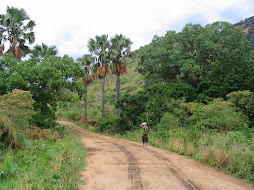
For those of you who have been following my blog since I left for Sudan in 2007, you might remember Job Odero, the Kenya missionary teacher who came to Ikotos at the same time as me. Job and I were the only foreigners at the school and faced many hardships together as we tried to improve the school. The existing teachers, who were mainly untrained, were resistant to change in "their" school, so it was a slow process. When I left Sudan (almost a year ago now-- May 22nd), I prayed for Job, and was worried about him being the only foreigner at the school continuely trying to make improvements.
Two Sundays ago I went to an Africa Inland Church service in Migori, the neighboring big town. After the service I spoke with the pastor, mentioning that I used to work in a school in Sudan with someone named Job Odero. The pastor's response was "Oh yeah, I know him." My response was "Are you sure? I doubt its the same one." So I made motions like an extremely skinny person and said "does he look like this? And is he a bit brown (which means that he's lighter)?" The pastor insisted he was the one, but he wasn't sure if he was in Sudan or not, so I gave the pastor my cell number to relay to Job or his wife.
On Thursday night, I received a random phone call from a number I didn't recognize-- I almost didn't answer it. Of course, it was Job! So we talked for a bit and decided to meet up on Sunday for church and then go to his house for lunch. Francis came along too, a.) because I'm not supposed to travel alone (Nuru Rules) and b.) Francis wanted to meet Job. Francis heard a lot about Job last Sunday upon my finding out that Migori was Job's home area. So he wanted to meet the man in the flesh.
So yesterday we did just as planned. We took the matatu (taxi van) into Migori, met Job on the outskirts of downtown, and proceeded to church. His oldest daughter and youngest son met us at the church. It was so cool to be at church with Job again, but this time seeing him with his family that I'd heard so much about while we were in Sudan. After church, we walked to his house, which wasn't far, and as I walked in the door, his wife gave me the biggest hug in the world. She's a thin lady, but it was quite the bone crushing variety of hug. During lunch, Job and I caught up on all the happenings of the school in Ikotos, from the time I left to February when he returned. Truly, he has suffered a lot of hardships at that school. There were some disgruntled (alcoholic) teachers who wanted to see Job in jail or beaten. I'd like to add right here that Job was by far the most moral and upright person at that school, and so any charges against him were positively devious. The former deputy head master, Otim-- who I had fired because of drunkenness and sexual harassment towards the female students, and I didn't pay him his salary in the end because he never showed up to work--had bribed a police officer to have Job thrown in jail. Within the same day, as Pastor Tobiolo, who's now like the mayor of the town, realized what happened, Otim quickly ran to the jail and forced Job to leave, fearing that he'd be found out for his devious act.
Through all of this hardship, the main reason for Job's return home was because of the lack of payment for working at the Ikotos school. His wife has been trying to support the children as Job attempts to receive payment for doing God's work; but now his oldest daughter is entering high school, which is a big expense. Job shared with me that when he came back home, he managed to scrounge up enough money to pay for 1st term, which was 20,000 Kenyan Shillings (roughly $260) , but as 2nd term has started, he's unable to send her. The cost for 2nd and 3rd terms are 10,000 Kenyan shillings each. Job found a job (ok, I know how funny that sentence is) at a local private primary school. He's been working there for a month now, and is paid approximately 10,000 Kenyan Shillings a month. The main thing is for him to be able to get off his feet after 2 years of not being paid a salary. At the moment I'm trying to think of ideas on how to help him do that. He's not like the people I'm working with in Nyametaburo and Nyang'iti, he was a successful teacher in Nairobi for many years; and his wife was a successful business lady until her kiosk was burnt to the ground during the election riots. It was only from meeting the AIC bishop of Sudan, and feeling God's leading to assist them at the school, did Job encounter such a financial situation.
...And so that was my Sunday.
Job with his family:

Job with his entire family, including his mom, aunt, nieces and nephews (that he helps support because some of his siblings have died from disease):







































